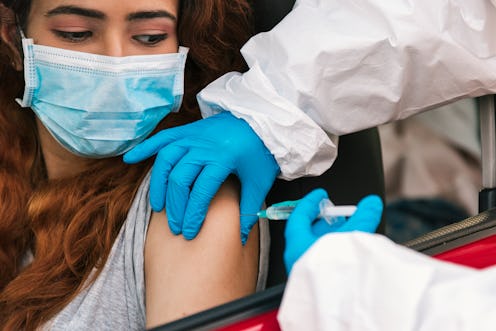Health
Here’s How Long COVID Vaccine Side Effects Should Last
Plus, how to prepare for them.

Your first vaccine dose didn’t affect you too severely — maybe your arm was a bit sore, but that was all. But your second dose hit you like a truck with nausea and fatigue. That’s pretty normal, as far as vaccines go — but you’ve got to know how many days to tell your boss you’ll be out of it. So, how long do COVID vaccine side effects last, anyway?
The first dose gave Jesse, 29, a low-grade fever. “Nothing too serious,” she says. “It was just something that I kept my eye on.” The second dose had her sleep extra hard that first night, but otherwise, she was fine. “My brother’s also an essential worker, and he was knocked out for two days,” she adds. “So I guess it’s different for everyone.”
Why Does The COVID Vaccine Have Side Effects?
“The most common side effects to COVID vaccines include pain at the injection site, fevers, chills, nausea, headaches, tiredness, and painful or swollen lymph nodes in the arm where the vaccine was injected,” says Dr. Vivek Cherian, M.D., a Baltimore-based internal medicine physician.
In the case of the COVID vaccine, side effects can be interpreted as a good sign. "Side effects from the vaccine are due to your body mounting an immune response, and everyone’s immune response is different based on their overall health," says Dr. Michael Richardson, MD, a family medicine doctor with One Medical. "Younger people have been found to be more likely to develop side effects, possibly due to their more robust immune system."
That doesn't mean you've got a weaker immune system or that your body isn't responding well to the vaccine if you don't get side effects, Dr. Richardson explains. It just means that different people's bodies can respond differently to the same stimuli.
Although side effects are in themselves nothing to worry about, it helps to be mindful of their type, intensity, and duration. For most people, any side effects they experience will be moderate, Dr. Cherian tells Bustle. But there are exceptions. “Severe allergic reactions called anaphylaxis can occur, however are quite rare,” he explains. “Most often these occur in people known to have had severe reactions to vaccines in the past.” According to the CDC, you’re likely to develop these allergic reactions to the vaccine anywhere from a few minutes to a few hours after your shot. Check in with your doctor if you’ve had any allergic reactions in the past to vaccines with the same ingredients as the three FDA-approved vaccines, Dr. Cherian advises. Otherwise, expect that you might develop brief, mild side effects.
How Long Do Different COVID Vaccine Side Effects Last?
Figuring out what kinds of side effects someone might get — and how long they may last — isn't an exact science. "Everyone responds to vaccines differently, so it's hard to predict if someone will develop side effects and what type," Dr. Richardson explains, "but the majority of side effects will resolve within one or two days."
Across clinical trials for the Pfizer, Johnson and Johnson, and Moderna COVID vaccines, scientists found similar trends. The most common side effects of the Johnson and Johnson vaccine are headaches and fatigue, which is also true of the Moderna vaccine side effects. The same occurred with Pfizer vaccine side effects, with all three vaccine types also commonly causing varying rates of injection site pain, fever, and muscle soreness.
Moderna, Pfizer, and J&J vaccine side effects all tend to go away on their own after a couple of days. It’s important to remember, though, that about 50% of clinical trial participants experienced fatigue, headaches, or muscle pain after receiving the second dose of the Moderna vaccine, so don’t be alarmed if the second shot hits you harder than the first with Moderna or Pfizer.
“I was fine after my first dose,” says Kael, 34. “But my second Moderna dose? Oof. I had to call out of work because I was so exhausted.” Still, they tell Bustle that they wouldn’t have it any other way. “Wiped out for one day is so much better than getting sick from the virus.”
Experts:
Dr. Michael Richardson, a family medicine doctor with One Medical
Dr. Vivek Cherian, M.D., Baltimore-based internal medicine physician
This article was originally published on